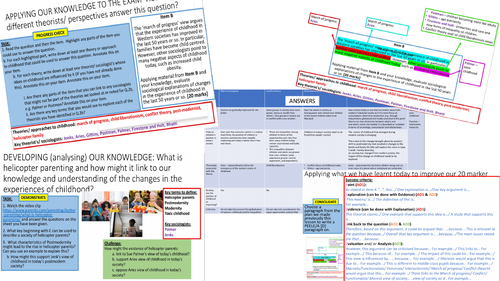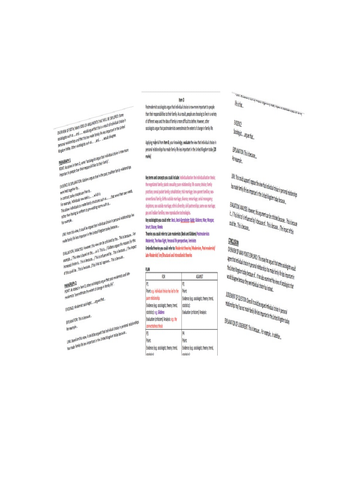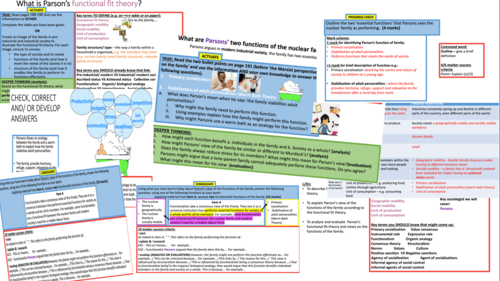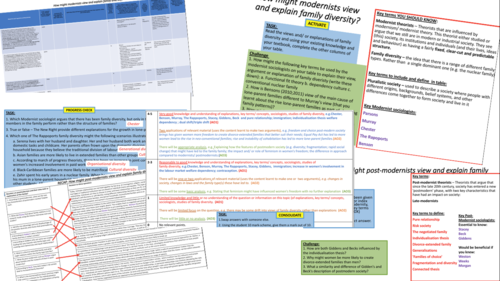
184Uploads
27k+Views
5k+Downloads
Sociology

AQA GCSE Sociology - Research methods: Social surveys
Detailed lesson with lots of scaffolding based on adaptive teaching that help students understand what are the strengths and weaknesses of using social surveys to investigate sociological issues (e.g how to identify the main features of social surveys and when it would be appropriate to use them, explains the strengths and weaknesses of using social surveys to investigate social issues and applies the strengths and weaknesses of social surveys to an exam question).
Covers the following key terms: Social surveys, Telephone surveys
Makes references to key terms students should know that link to this lesson.
Lesson requires students to have prior knowledge of practical, ethical and theoretical issues to the strengths and weaknesses of social surveys
No starter included in the lesson
ANSWERS TO MAIN ACTIVITY ONLY.
Includes an exam question with scaffolding to help students answer.
I used the lesson as an opportunity to write an answer to the 4 marker with students.
Resources can be found at the end of PPT

AQA GCSE Sociology: Family- Explaining the increase in divorce
Detailed lesson with lots of scaffolding based on adaptive teaching that explain the increase in divorce.
Includes a 4 marker with detail scaffolding to help students answer it. Includes a student-friendly mark scheme for self or peer-assessment.
Includes two versions of the table needed for the carousel activity - one with scaffolding and one without
Covers the following key terms: Secularisation, Stigma, Empty shell marriage
Covers the following sociologists: Office for National Statistics (ONS), Dennis , Fletcher, Hart, Goode, 1969 Divorce Reform Act, Mitchell & Goody
Covers the following key terms you should already know: Function (of an instituition), Individualism, Collectivism, Contemporary society, Consumerism/ Consumption
ANSWERS TO SOME MAIN ACTIVITIES INCLUDED
Makes references to key terms students should know – Promotes a spiral curriculum by making links to key terms that students might have previously been taught that link to this lesson.
RESOURCES CAN BE FOUND AT THE END OF PPT

AQA GCSE Sociology: Family - Feminist functions of the family
Includes 4 marker ‘perspective question’ on Delphy and Leonard with scaffolding to help students answer this question and others like
Includes ‘teaching to all’ activity that develops students ability to draw on the sociological perspectives and ideas they have learnt to answer 12 markers.
Includes scaffolding to help students write a paragraph for a 12 marker using what they have learnt in the lesson on Delphy and Leonard’s view of the functions of the family.
ANSWERS TO MOST ACTIVITIES INCLUDED

L5 AQA A-level Families- Couples: Domestic violence
Detailed and differentiated (up and down) student-led lesson that examines and analyses the following key terms to examine patterns and explanations of domestic violence: Domestic violence/ abuse, Radical feminists, Materialism,
Marxist feminism, Radical feminist explanation (of domestic violence)
Marxist feminist explanation (of domestic violence),Materialist explanation (of domestic violence)
Examines the views of the following sociologists: Dobash and Dobash, Millet and Firestone, Wilkinson and Pickett, Ansley
***** Makes reference to other key terms students might know that link. **
***** ANSWERS to MAIN activities INCLUDED****
Uses and refers to ’ AQA A Level Sociology Book One Including AS Level: Book one 3rd Revised edition by Rob Webb, Hal Westergaard, Keith Trobe, Annie Townend ’ textbook

Sociology Education Class diff in achievement (external & internal) Folder organisation lesson
Explores the importance of organisation and guides and supports students in organising their classwork for class differences in achievement external and internal factors (Topic 1& 2 AQA A/ AS-level spec)
Includes:
Assessment tracker
Example of how folder might be organised
Reflection activity
Education folder dividers - to help students separate and organise their class and home learning.
Made for AQA A/AS-level Sociology but can be used for ANY SPEC

AQA A-level Sociology: Families Topic 2 ‘Childhood’ Revision lesson
Detailed and differentiated (up and down) student led lesson that supports students in recapping the main theories, views and explanations of the position of childhood; examines how march of progress, conflict, child liberationists and postmodernist theories’ view society and how this might influence their approach or view of childhood and its changes over time. Also highlights the key sociologists (Katz, Postman, Aries, Palmer, Jenks, Gittens) in this topic.
The lesson then requires students to apply this knowledge to plan (using a success criteria) a 20 marker and write at least one paragraph for it.
RESOURCES CAN BE FOUND AT THE END OF THE PPT.
MODEL PLAN AND ANSWERS FOR MAIN ACTIVITY CAN BE FOUND ON NEXT SLIDE AFTER ACTIVITY SLIDE

WRITING FRAME - AQA A-level Sociology: Families – Topic 3 Theories of the family 20 marker
Detailed writing frame that scaffolds (from introduction to conclusion) a full answer for a 20 marker on the family being beneficial (family -topic 3 theories of the family). Models how to use the item to select points or arguments to answer the question.
*** Based on AQA specification**
Supports students with planning the 20 marker (using the item) - using planning success criteria.
Outlines the success criteria and provides sentence starters for the full essay (intro, main body and conclusion). Success criteria used for paragraphs in main body of essay is PEELE/A
Outlines the key terms, sociologists, theories that can be used when answering the question.
Supports students who need support and guidance with writing essays whilst providing students who are already good at writing essays opportunities to further improve their essay skills.

WRITING FRAME - AQA A-level Sociology: Families – Topic 6 Family diversity 20 marker
Detailed writing frame that scaffolds (from introduction to conclusion) a full answer for a 20 marker on evaluating the view that individual choice in personal relationships has made family life less important in the United Kingdom today (family -topic 6 family diversity).
*** Based on AQA specification**
Models and supports students with how to use the item to select points or arguments to answer the question and how to plan essays using planning success criteria.
Outlines the success criteria and provides sentence starters for the full essay (intro, main body and conclusion). Success criteria used for paragraphs in main body of essay is PEELE/A
Outlines the key terms, sociologists, theories that can be used when answering the question.
Supports students who need support and guidance with writing essays whilst providing students who are already good at writing essays opportunities to further improve their essay skills.

AQA GCSE Sociology: Family- Marxist functions of the family (Zaretsky)
Detailed lesson with lots of scaffolding based on adaptive teaching that help students understand marxist functions of the family (Zaretsky)
Includes key term sheet with definitions for the lesson (new key terms but also key terms that students should have been taught previously that link to this lesson)
Includes 4 marker ‘perspective’ exam question and provides scaffolding to help students answer it and includes student friendly mark-scheme for peer or self assessment.
ANSWERS TO MAIN ACTIVITIES INCLUDED
Covers the following key terms: Unit of consumption, The Marxist Warm Bath Theory, Socialism
Covers the following key sociologists: Zaretsky
Covers the following key terms that should already be known: Family form – Convention nuclear family – Bourgeoisie - Proletariat – Unit of consumption – Economic function – Stabilisation of adult personalities (The Warm Bath theory) - The traditional domestic division of labour - The contemporary domestic division of labour -Capitalism - Marxism - Profit - Social class - Ownership – Exploit - Inequality - Capitalism - Means of production - Structuralism vs Interactionism - Conflict vs Consensus theory - Agency of socialisation - Agents of socialisations – Systems – Processes - Agency of social control - Agents of social control - Culture - Norms - Values Social processes - Social structures - Positive sanctions Negative sanctions - Socialisation - Primary socialisation - Secondary socialisation
Makes references to key terms students should know – Promotes a spiral curriculum by making links to key terms that students might have previously been taught that link to this lesson.
RESOURCES CAN BE FOUND AT THE END OF PPT

AQA GCSE Sociology: Education - Class diff in achievement (pupil subcultures)
****Detailed lesson with lots of scaffolding based on adaptive teaching that help students describe how setting might cause pupils to form pupil subcultures. To explain how pupil subcultures might explain class differences in achievement . Students will also be able to analyse and evaluate pupil subculture as an explanation for class differences in achievement
****Cover the following key terms: pro-school subcultures, anti-school subcultures/counter-cultures
****Covers the following sociologists: Willis
ANSWERS TO SOME MAIN ACTIVITIES INCLUDED .
**** key terms students should know: Banding, setting, pupil subculture, Norms, Values
RESOURCES CAN BE FOUND AT THE END OF PPT

AQA/GCSE Sociology- Independent schools vs State schools
Detailed lesson with lots of scaffolding based on adaptive teaching that help students understand independent schools vs state schools.
Cover the following key terms: Independent schools, Private schools, National curriculum, State-funded school
Covers the following sociologists: The Sutton trust (2011)
ANSWERS TO MOST ACTIVITIES INCLUDED
Key terms you SHOULD know that link: State schools, Independent/ private schools, national curriculum, Public school (extension), Admission policy (extension), Marxism.

AQA GCSE Education - Class differences in education (Cultural capital)
Teaches the following key terms:
Cultural capital
Educational capital
Economical capital
Selection by mortgage (extension)
Makes reference key terms students might have learnt whilst learning about Sugarman’s working and middle-class values:
Meritocracy
Future-time orientation
Deferred gratification
Individualism
Covers Bourdieu’s key study
Includes a 3 marker with detailed scaffolding to help students answer it. Student friendly mark-scheme included for this 3 marker.
SOME ANSWERS INCLUDED.
Includes key term sheet with definitions needed for the lesson.
Includes dicsussion activity with prompts to promote oracy

AQA GCSE Sociology - family: Functionalist function of the family (Murdock)
Detailed lesson with lots of scaffolding based on adaptive teaching that help students criticise Murdock’s four functions of the family and analyse them by considering how they might benefit individuals and society as a whole.
Cover the following key terms:
Sexual function
Reproductive function
Education function
Economic function
Covers the following sociologists:
Murdock
ANSWERS TO SOME/ MOST/ ALL MAIN ACTIVITIES INCLUDED
*Key terms students should know:
Symmetrical family, Dual burden, Dual career families, Triple shift, Emotion work, Child-rearing,Primary socialisation, Segregated conjugal roles, joint conjugal roles, Expressive role, instrumental role, Breadwinner, Functionalism, Organic analogy
RESOURCES CAN BE FOUND AT THE END OF PPT
Includes 'teaching to all activity
ANSWERS FOR ACTIVITIES INCLUDED
Plenary helps students develop their ability to read and interpret exam items.
Includes a key term and definition sheet for the lesson (new key terms but also makes links to key terms students should have previously learnt)
Includes key term and definition sheet for the lesson

AQA GCSE Sociology - Education- Class differences in achievement- cultural deprivation
Detailed lesson with lots of scaffolding based on adaptive teaching that help students understand
Cover the following key terms:
Material factors
Cultural factors
Cultural deprivation
Speech code
The elaborate code
The restricted code
Subculture
Immediate gratification
Deferred gratification
Collectivism
Individualism
Fatalism
Present-time orientation
Future orientated
Key terms you should already know that link:
Class differences in achievement
Educational achievement
External achievement
External factors
Internal Factors
ANSWERS TO ALL MAIN ACTIVITIES INCLUDED
RESOURCES CAN BE FOUND AT THE END OF PPT
Teaching to all technique included

AQA GCSE Sociology: Family-Changes in the family over time
Detailed lesson with lots of scaffolding based on adaptive teaching that help students understand changes in the family over time.
-Includes a ‘teaching to all’ activity
-ANSWERS TO MOST ACTIVITIES INCLUDED
-Includes a item 4 marker on Young and Wilmott’s study with lots of scaffolding to help students answer it.
Covers the following key terms: Pre-industrial society, Industrial society, Unit of production, Asymmetrical family, The Principle of Stratified diffusion, Home-centered, Work-centered, Child-centered.
Covers the following key terms that you should already know: Pre-industrial society, Industrial society,
Contemporary society, Agriculture, Industries, Industrial revolution, Unit of production, Unit of consumption, Extended family, Social mobility, Ascribed status, Means of production, Geographic mobility, Symmetrical family, Commercialisation of housework.
Covers the following sociologists:Young & Wilmott.
ANSWERS TO MOST MAIN ACTIVITIES INCLUDED
Makes references to key terms students should know – Promotes a spiral curriculum by making links to key terms that students might have previously been taught that link to this lesson.

AQA GCSE Sociology: Families - Functionalist functions of the family (Parsons
Detailed lesson with lots of scaffolding based on adaptive teaching that help students understand how might the family function to benefit individuals and society.
Cover the following key terms: Stabilisation of adult personalities (The Warm Bath Theory), The Warm Bath Theory analogy , Idealisation
Cover the following key sociologists: Parsons
Plenary includes an Item B 4 marker with detail scaffolding to help students answer it
Includes key term sheet for the lesson with key terms and definitions (and makes links to key terms students should or might know that link)
No starter activity
ANSWERS TO SOME ACTIVITIES INCLUDED
RESOURCES CAN BE FOUND AT THE END OF PPT

AQA GCSE Sociology Education - Education policy before 1988
Detailed lesson with lots of scaffolding based on adaptive teaching that help students understand Education reforms before 1988 (e.g. The main educational policies before 1988, the impact of educational policies before 1988, how to apply sociological perspectives to educational policies and evaluate them).
Cover the following key terms:
Education policy
Education reform
The tripartite system
Secondary modern
Comprehensive system
Secondary moderns
State-run schools
Eleven- plus exam
Compulsory [state] education
Selective schools
ANSWERS TO ALL MAIN ACTIVITIES INCLUDED .
Key terms students should know:
Grammar vs comprehensive schools , Academies/ free schools,
State-run education/ schools, Working-class subculture, Culture Norms, values, setting Mixed-ability classes, Banding Local Education Authority (LEA), Independent/ private schools
RESOURCES CAN BE FOUND AT THE END OF PPT

AQA A-level Sociology Families: Theories of the family – Parson’s view of the family
Detailed and differentiated (up and down) student-led lesson that examines, analyses and evaluates functionalist Parsons view of the family (functional fit theory) and his functions (mainly stabilisation of adult personalities – NOT primary socialisation).
Lesson explores the key terms: Functional fit theory, Stabilisation of adult personalities (Warm Bath Theory), Functional fit theory, Geographic mobility, Social mobility, Unit of production and Unit of consumption.
Lesson makes links to general functionalist key terms and family key terms that students might have previously been taught.
Main activity makes reference to AQA A-level Book 1 by Townsend
***** MOST ACTIVITIES INCLUDE ANSWERS****
Starter assesses prior learning on family topics: couples, childhood and Murdock’s functions.
***** WORKSHEETS AT THE END OF THE PPT**

AQA A-level Sociology: Families Topic 5 ‘Changing family patterns’ Revision lesson
Detailed and differentiated (up and down) student led lesson that
recaps changing family patterns learnt of Family Topic 5 and the reasons for them.
allows students to develop their AO2 (application) and AO3 (analysis) skills by considering the relationship changing family patterns might have with other aspects of the topic, as well as other topic in families and household, such as the domestic division of labour (couples), experiences of childhood (childhood), the characteristic of populations (demography).
***This part of the lesson is very helpful for developing the skills students need for to answer ‘Outline and explain’ 10 markers which requires students to demonstrate the ability to connect two elements, aspects, subtopics, or topics to answer the question. *
concludes by requiring students to apply this knowledge to ‘outline and explain’ 10 markers and one item 10 marker.
RESOURCES CAN BE FOUND AT THE END OF THE PPT.
ANSWERS FOR MOST OF THE ACTIVITIES CAN BE FOUND ON NEXT SLIDE AFTER ACTIVITY SLIDE

AQA A-level Sociology: Families Topic 6 ‘Family diversity’ Revision lesson
Detailed and differentiated (up and down) student led lesson that aims to recap and consolidate student’s knowledge and understanding of:
key sociologists (Parsons, Murray, Chester and Benson, Stacey, Beck, Giddens and more)
key terms (Rapoports’ different types of diversity, neo-conventional Pure relationship, Risk society, negotiated family, individualisation thesis, Divorce-extended family, 'Families of choice’, Fragmentation and diversity, Connected thesis and more) in the family diversity topic of the family unit.
the main difference in modernist and postmodernist views of: society, the family AND explanations of family diversity.
INCLUDES STUDENT FRIENDLY MARK-SCHEME FOR 10 MARKER ON THIS TOPIC
RESOURCES CAN BE FOUND AT THE END OF THE PPT.
ANSWERS FOR MOST ACTIVITIES (Recap and planning activity) INCLUDED AND CAN BE FOUND ON NEXT SLIDE AFTER ACTIVITY SLIDE
INCLUDES ORACY ACTIVITY




















